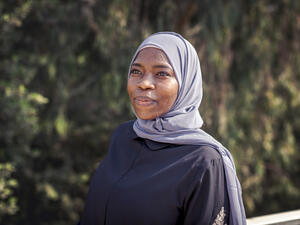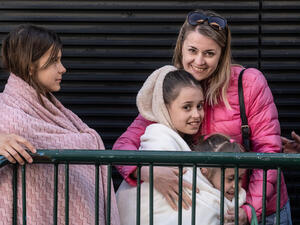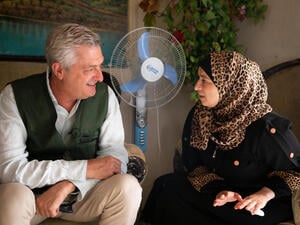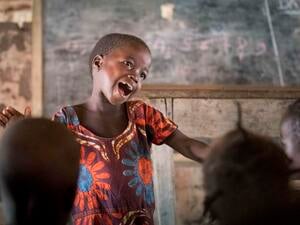UNHCR-UNICEF in $129 million appeal to get Iraqi children back to school
UNHCR-UNICEF in $129 million appeal to get Iraqi children back to school

Iraqi refugee children listen to stories read at a UNHCR-funded community centre in Damascus. UNHCR and UNICEF have launched an appeal designed to get Iraqi refugee children back into school.
GENEVA, 27 July (UNHCR) - The UN refugee agency and UNICEF launched a $129 million joint appeal on Friday to ensure tens of thousands of uprooted Iraqi children who have fled their homeland can resume their education.
Warning that a generation of Iraqis could grow up uneducated and alienated, the two UN agencies presented a plan to support host governments such as Syria, Jordan, Egypt and Lebanon in providing schooling for an additional 155,000 young Iraqi refugees during the 2007-08 school year.
More than 2 million Iraqis have fled to nearby countries - primarily Syria and Jordan - to escape continuing violence in their homeland. About 500,000 of them are of school age and most currently have limited or no access to education.
"These host countries have borne an enormous burden caring for millions of Iraqis," said Judy Cheng-Hopkins, UNHCR's Assistant High Commissioner for Operations. "The sheer number of uprooted Iraqis has oustripped the capacity of their infrastructure to cope, particularly in the area of education. So we are now asking for international support specifically aimed at assisting these generous host governments in getting Iraqi children back into school."
At a news conference at the United Nations in Geneva, Cheng-Hopkins thanked Jordan for its announcement on Thursday that it would give all Iraqi children in the country access to Jordanian schools. "We are very grateful to Jordan for this humanitarian decision."
Pierrette Vu Thi, Deputy Director of UNICEF's Office of Emergency Programmes, said: "UNICEF believes schooling is a primary concern in all emergency situations because it can help restore a sense of normalcy to the lives of children and can help them overcome psychological and other forms of distress. The Jordanian and Syrian governments have done a tremendous job so far of welcoming Iraqis as guests. The children of Iraq have waited long enough. Action must be taken now so that children are ready to go to school when classes begin."
The $129 million appeal notes that of an estimated 300,000 Iraqi school-age children in Syria, only about 33,000 are currently enrolled, although the government has given them full access to schools. In Jordan, the government estimates 19,000 Iraqi girls and boys are in school, while at least 50,000 do not attend.
The goal of the appeal, which covers what would be possible to achieve in the period from August 2007 to the end of 2008, is to enable another 100,000 Iraqi children to attend school in Syria; 50,000 in Jordan; 2,000 in Egypt; 1,500 in Lebanon and 1,500 in other countries in the region.
UNHCR and UNICEF will work with the ministries of education and other partners in each country to expand the capacity of public schools; reintegrate those who have dropped out of school - particularly girls and adolescents; provide outreach and direct support to some 12,000 poor and vulnerable families; and inform Iraqi families of the opportunity to get their children back into school.
Specific activities will include providing pre-fabricated classrooms and buildings as soon as possible; identifying existing buildings that can be used as temporary schools; upgrading water and sanitation in schools; building new schools or additional classrooms; and rehabilitating existing schools. Double-shifting in existing schools will be an option.
Buses will be rented or purchased to transport children to school. The appeal estimates more than 4,000 new teachers will be required for the 155,000 additional children. The UNICEF - UNHCR programme will cover salaries, other entitlements and training costs for the additional teachers.
Many children have already missed up to three years of schooling and remedial programmes and psycho-social support will be established for them and their families in hopes of reintegrating them in the school system. Training will be provided to school counsellors and teachers to deal with the special needs of Iraqi children, many of whom suffered traumatic experiences.









